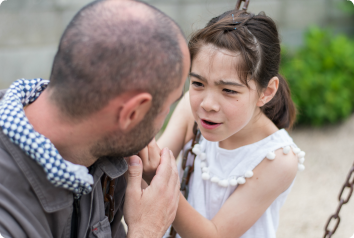 This content was originally published by Creating a Family, the national infertility education and support nonprofit.
This content was originally published by Creating a Family, the national infertility education and support nonprofit.
There are no clear rules that always apply to navigate relationships with people who are actively addicted. It depends on so many factors. But Kate Cleary, Executive Director of Consortium for Children, who has negotiated many post-adoption openness agreements and is an adoptee whose birth mother was addicted, suggests the following guiding principles for helping to navigate a relationship when the birth parent is addicted.
- Accept that you bring your own anger and grief to the relationship.
- Accept that you aren’t going to change your child’s birth parents and even if you could stop the addiction, they won’t be like you.
Accept your own grief and anger
There are many reasons an adoptive parent might be angry at their child’s addicted birth parent. Perhaps their precious child is suffering from the effects of prenatal exposure. Or maybe they had an idealized version of what an open adoption relationship would be like, and this birth mother is ruining their fantasy. It could be that they grew up with an addiction in their own family, and they have little patience to bring to this relationship.
Frequently we hear from adoptive parents that their child is upset if their birth mom or dad “seems off” in a meeting. While this may be true, depending on how high the birth parent is, it is also true that the child is picking up your discomfort. Children are amazingly adept at reading us, and if you are angry or sad at the birth parent, you are sending off cues to the child.
accept what you can’t change
The Serenity Prayer says it all: “God grant me the serenity to accept the things I cannot change, courage to change the things I can, and wisdom to know the difference.”
You are not going to change your child’s birth parent. Even if you could magically take away their addiction, they would likely not be like you. You both love this child, and that is your common ground from which to build.
You are not going to change the past, and if you could, your child would likely not be your child. Deal with your grief and anger and move on to be able to maintain a relationship with your child’s addicted birth parent.
drop the judgment
As hard as it might be, your goal is to approach the birth parent who is addicted with compassion and lack of judgment. She did not set out to become an addict. She uses drugs as her way to deal with the pain/sadness/difficulties in her life. We might all agree that this is not the healthiest way to deal with life problems, but we all have our ways of doing this—some are more healthy than others. Your judgment will get in the way of your relationship, and you want to have some relationship because it is in the best interest of your child.
is it ok for a child to be around his birth parents if they are high?
There is no clear “yes” or “no” answer to whether it harms a child to be exposed to his birth parents when they are high or stoned. It depends on many factors.
- How does the birth parent act? Is she stoned out of her mind or is she on a low maintenance dose to keep withdrawal at bay, or somewhere in between.
- How old is the child?
- What does the child say about contact with his first mom when she is high?
- Was the child adopted at an older age after having lived with his birth mom? Many kids are worried about their birth parents, and periodically seeing them can reduce their worry.
One of the challenges is separating your discomfort or frustration or issues from what is in the child’s best interest. Most (all?) birth parents have something to give to their child, and you don’t want to deprive your child of this gift unless you absolutely have to.
6 Concrete Tips for Co-Parenting with Your Foster Child’s Birth Parents
Talking with children
For younger children, do not tell them ahead of time that they are meeting with their birth parent to avoid the disappointment if they don’t show up. For older kids, help them learn to manage their expectations and use this as an opportunity to talk with them about their birth parent’s drug abuse.
Do not demonize your child’s birth parent. It may be necessary to acknowledge that she has a problem, but you must also find positive things to say.
Lay the groundwork for telling your child about his birth mom or dad’s addiction from the very beginning. “Your birth parents loved you, but they weren’t able to take care of you.” As the child grows, you can start filling in the blanks year by year about why they weren’t able to take care of him. He should know the full story sometime by around age 10-12. Make sure that you also include positive things about his birth parents.
We have an excellent course on this topic with Kate Cleary.
Originally published 7/10/2019 by Dawn Davenport on Creating a Family.


